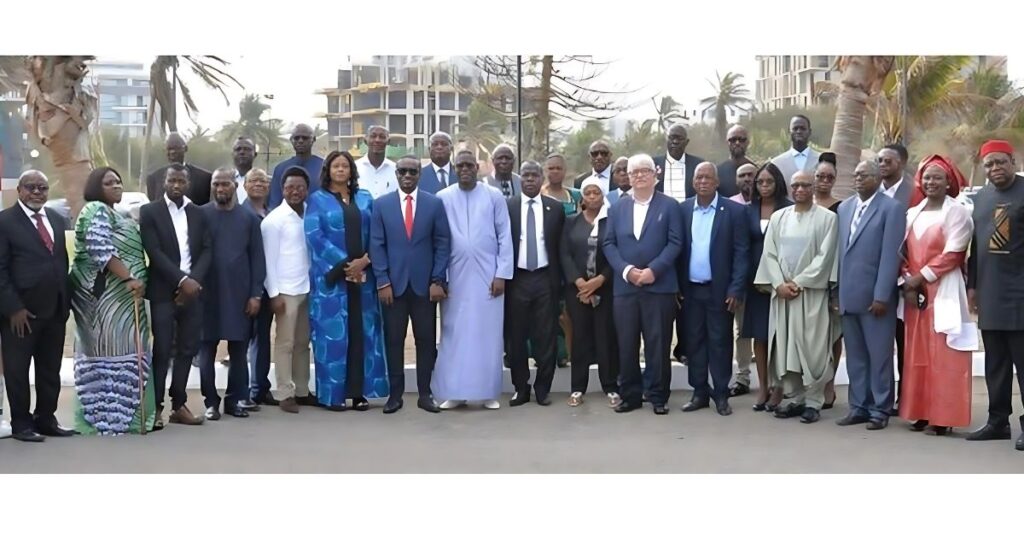Call us now:

Following the adoption of the new “Supplementary Act A/SA.3 /07/22 Amending Supplementary Act A/SP.17/02/12 Relating to the Harmonization of Standards and Procedures for the Control of Dimensions, Weight, and Axle Load of Goods Vehicles in West Africa”, ECOWAS in close collaboration with UEMOA convened an awareness raising meeting of Transport Experts from Member States, Regional Transport Unions, International Transport Federation and the African Development Bank, on the Harmonized Regional Supplementary Act on Axle Load Control in West Africa, which also considered more punitive Fees and Fines Schedule to be presented for the adoption of the ECOWAS Council of Ministers.
The Workshop, the first in a series sensitize key transport stakeholders on the implementation of the newly adopted Act, which has improved provisions based on the limitations and challenges of the old ECOWAS Supplementary Act A/SP.17/02/12 signed in 2012 as well as the UEMOA Regulation 14 signed in 2005 on the control of axle load in the region.
Welcoming experts to the meeting, Mr. Chris Appiah, Ag. Director of Transport at the ECOWAS Commission, thanked all participants on behalf of Mr. Sediko Douka, Commissioner for Infrastructure, Energy and Digitalization, for finding time to attend this very important awareness workshop.
The Ag. Director recalled the importance and potential benefits of the harmonized Axle Load Regional Act to enhancing the fight against excessive overloading in the ECOWAS and UEMOA Regions, while highlighting the dangers of overloading and its negative impacts on the roads of the community. He appealed to Member State Experts and Transporters, especially owners of haulage trucks, to intervene and ensure the timely and full implementation of the newly adopted Supplementary Act to protect the investments made in constructing roads to support economic development and integration.
He informed that following a very rigorous diagnostics of the earlier regional texts namely the ECOWAS Supplementary Act A/SP.17/02/12 signed in 2012 as well as the UEMOA Regulation 14 signed in 2005, as well as experiences encountered in their implementation over the past 15 years, the harmonized Regional Act has amended several provisions which makes it an improved legal framework to better control overloading in the region. A few news improvements involved the co-responsibility between drivers, owners, and shippers, and between platforms and drivers, where the vehicle driver, owner, and the shipper are jointly and severally responsible for non-compliance with standards on the public highway; mandatory requirement to offload excess loads and correct the dimensions to comply with the regulations before the vehicle is allowed back on the road; the mandatory requirement for all platforms (companies, manufacturer, distributers, etc.) that generate 100,000 tons of freight per year to be fully equipped with weigh bridges; and a clarion call on governments to strictly apply revenue from overload fines for road maintenance.
“The Commission has therefore drafted a Schedule of Fees and Fines with stricter punitive regimes for non-compliance, as well as the responsibilities for each stakeholder group outlined in a Regional Action Plan. This is to protect the taxpayer’s money invested in constructing the roads, and hence all Member States are strongly urged to work with the ECOWAS and UEMOA Commissions to propagate the contents of the new harmonized regional law, and ensure that haulage transport owners, drivers and all involved in overloading are fully aware of the provisions of the Supplementary Act to be applied in the Region”.
He concluded by assuring participants that the ECOWAS and UEMOA Commissions are committed to collaborate and jointly ensure the full implementation of the new Harmonized Act, while also calling on Member States Experts to made it a duty to bring the provisions of the new Act to their rank and file. The two Commissions will intensify periodic monitoring missions to the uniform application of Regional Act in all Member States.
In his welcome address, Mr. Mamoudou Alassane CAMARA, Director General, Road Infrastructures and Accessibility, representing the Honorable Minister of Infrastructure, Road Transport and Accessibility, welcome all participants to Dakar. He reminded the meeting of the importance of having a single legal text for overload control as demanded by Member States through the diagnostic studies and the validation workshop in Lomé, Togo, where ECOWAS and UEMOA were further urged to harmonize their texts and collaborate in the issue of overload control.
He therefore congratulated ECOWAS and UEMOA Commissions for harmonizing and adopting the New Supplementary Act by all ECOWAS and UEMOA Member States and urged all actors to support its implementation. He briefed the meeting on how Senegal was able to concession the Axle Load stations to ensure compliance and efficiency in the implementation of the Supplementary Act.
The meeting involved the detailed presentation of the new harmonized Regional Supplementary Act on Axle Load Control in West Africa as well as discussions on the practical implementation of the texts. The new regional Axle Load Control Action Plan, Communications Strategy, Regional Drivers Guide and a draft of the Regulation on Fees and Fines were also presented and deliberated on. Representatives of the Regional Transport Unions namely the West African Road Transporters Union (WARTU), Union des Conducteurs Routiers de l’Afriques de l’Ouest, de la Mauritanie et du Maroc (UCRAO), International Transport Federation (ITF) and CESCRAO, also took turns to pledge their willingness to support ECOWAS and UEMOA to ensure the successful implementation.
The meeting ended with Member States and Regional Transport Unions reiterating their commitment to jointly work towards curbing the negative impacts of overloading and sensitizing the masses on the new penalties outlined in the New Supplementary Act.
Source : www.ecowas.int
